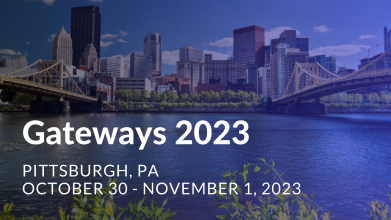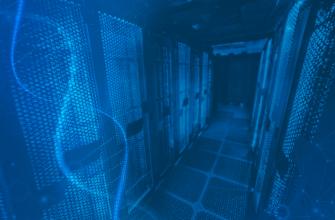The CDS-Exchange Community Fellows program aims to support educators in creating and sharing cutting-edge instructional resources that integrate computational and data science approaches across fields. The focus for this year’s cohort will be data visualization techniques. Selected fellows will receive funding, training, and mentorship to develop open educational materials that can be widely disseminated to fellow instructors in the CDS community.

OpenInfra Days are annual events organized by local User Groups and companies, typically lasting one or two days and featuring keynotes, breakout sessions, and workshops. The first OpenInfra Days North America, hosted by Indiana University, is being organized by participants from the United States, Mexico, and Canada. We encourage involvement from users and companies from these countries and hope to have lively networking and community-building from within North America.
The Ookami team is pleased to announce the addition of two NVIDIA Grace CPU Superchips (144 Arm Neoverse V2 CPU cores with Scalable Vector Extensions (SVE2)).
The new nodes are now available to all Ookami users. If you are interested in using them, get an allocation on Ookami.
The ACM SIGHPC Education Chapter is seeking nominations for candidates for the 2024 Educational Award For Outstanding Contribution to Computational Science Education.
We are seeking candidates who have led projects or programs that have made significant contributions to computational science education defined broadly to include all disciplines and all education levels. The executive committee of the SIGHPC Education Chapter (Chair, Vice-chair, and Secretary-treasurer) and SIGHPC are not eligible for this award.
Nominations will be evaluated based on these criteria:
Consider submitting a tutorial proposal for SC’24, Atlanta, 17-22 Nov 2024. SC Tutorials is one of the largest tutorial programs at any computing-related conference. These high-quality tutorials are a highlight of the SC Conference.
The NSF is requesting information about potential AI research and education use cases for infrastructure shared through the National Artificial Intelligence Research Resource (NAIRR).
Join NVIDIA’s Deep Learning Institute (DLI) this February for a series of free, virtual instructor-led workshops providing hands-on experience with GPU-accelerated servers in the cloud to complete end-to-end projects in the areas of Generative AI and Large Language Models (LLMs). Each of these workshops are led by a DLI Certified Instructor and offer an opportunity to earn an industry-recognized certificate of competency based on assessments to support your career growth.
Learn more about the Ookami cluster (CPU only)
Whether you need computational resources and consider getting an account, you are a new user just getting familiar with the system, or a longtime user, who wants to optimize their usage, this webinar is for you!
It will cover the basics of the system, what it's best suited for, a lot of tips and tricks on how to use it efficiently, and instructions on how to get an account.
The ByteBoost team is thrilled to announce the launch of the ByteBoost Cybertraining Program. This groundbreaking program is driven by the imperative to enhance researchers' proficiency and productivity when navigating cutting-edge, specialized computing technologies. By offering experiential learning opportunities on modern computing technologies, ByteBoost will empower researchers to make the best computing choices in the ever-changing landscape of computational technology.
On 01/31/2024 at 4pm, the queues for Stampede2 closed permanently.
Jobs that are already in the queue will complete their runs. No new jobs will be accepted.
Stampede2 login nodes will remain up so that you may continue to transfer data to Stampede3: https://docs.tacc.utexas.edu/hpc/stampede3/#migrating
If you would like to request an allocation on Stampede3, you may do so here: https://allocations.access-ci.org/
We are thrilled to announce the launch of the ByteBoost Cybertraining Program. This groundbreaking program is driven by the imperative to enhance researchers' proficiency and productivity when navigating cutting-edge, specialized computing technologies. By offering experiential learning opportunities on modern computing technologies, ByteBoost will empower researchers to make the best computing choices in the ever-changing landscape of computational technology.
Hello all,
We are pleased to announce we have opened up the login nodes for the new Stampede3 system, to allow you to begin the migration process.
At this time functionality is still limited; the new storage system and updated software stack are now available, but the only compute nodes available for running jobs are a few of the old Stampede2 “SKX” and “ICX” nodes (the login nodes do have the new Sapphire Rapids chip).
Purdue Research Computing personnel will observe the university winter break beginning on December 22nd, 2023, and will resume normal business hours on January 2nd. During this time, Research Computing services will continue to be available, but all staff will be on leave.
Critical system outages will be dealt with should they occur during this time. Other support needs will be handled when the University re-opens on January 3rd.
Have a wonderful break, everyone, and we look forward to great things in the new year!
Over the next few months, Stampede2 will transition to Stampede3. In order to ensure this transition is as smooth as possible, please carefully read this announcement.
Future High-Performance Computing Experts: Are you ready to elevate your skills in scientific computation, parallel programming, machine learning and artificial intelligence? Are you a graduate student or early-career postdoc? Will your research involve large-scale computations? Are you eager to join a global community of HPC practitioners? The IHPCSS 2024 is in the planning phase, and needs your help in making it a reality.

HuBMAP is offering a paid summer research experience where undergraduate students from underrepresented backgrounds will be placed in HuBMAP labs across the country. The internship program provides a fantastic opportunity to learn an exciting new area of biology, build connections, gain valuable scientific skills, and conduct research in single cell biology.
The Platform for Advanced Scientific Computing (PASC) invites minisymposium submissions for PASC24, co-sponsored by the Association for Computing Machinery (ACM) and SIGHPC, which will be held at ETH Zurich, HCI Campus Hönggerberg, Switzerland, from June 03 to 05, 2024. The deadline for submitting an expression of interest is Oct 21, 2023.
One year into the new NSF ACCESS program, Globus and ACCESS continue to work together to simplify the data management experience in the nation’s premier open science computing environment.
The PEARC Steering Committee is now accepting nominations for steering committee members at large as well as the 2025 conference general chair. Please consider who you might nominate for these roles and help us spread the word within your communities!
Pittsburgh Supercomputing Center (PSC) is soliciting the next round of proposals for computer time on Anton 2, a special-purpose supercomputer for molecular dynamics (MD) simulation designed by D. E. Shaw Research (DESRES). Anton 2 enables biomolecular simulations running nearly 100 times faster than the state of the art on traditional supercomputers. Anton 2 is made available without cost by DESRES and supported by NIH for non-commercial research use by universities and other not-for-profit institutions. Proposals are due on Thursday June 29, 2023.
Exciting news for students interested in research computing and data science! The application deadline for the Student Program at PEARC23 has been extended by two weeks until May 15.

Since 2017, PEARC (Practice & Experience in Advanced Research Computing) has been the premier place for the real nuts and bolts of research computing, welcoming scientists, operations, students and vendors alike. Volunteering for the PEARC leadership committee is an exciting opportunity to make an impact and serve the community. Whether you have served on the committee before or are looking to join the committee, we would be excited to hear from you.

Gateways 2023 is an opportunity for science gateways to showcase their ability to teach, empower and engage research, and provide technologies to various communities. It will also offer diverse options for sharing work and networking in the community. Presentations, demos, panels, and tutorials are due June 5, 2023. BYOP - Bring Your Own Portal and poster submissions are due August 7, 2023.
The National Science Foundation-funded AI Institute for Intelligent Cyberinfrastructure with Computational Learning in the Environment (ICICLE) is now accepting applications for its 2023 Educational Fellows Program.
The AI and Big Data team at the Pittsburgh Supercomputing Center is pleased to announce that the Neocortex Spring 2023 Call for Proposals is now open. Proposals are welcomed for access to Neocortex, an innovative and exciting NSF-funded AI supercomputer.
For researchers with the largest-scale computational, analysis, and storage needs, requests for Maximize ACCESS allocations can be submitted during the period of March 15 - April 15. Approved allocations will begin or renew on July 1, 2023.
Summer Internships at the Texas Advanced Computing Center (TACC)! Eligible applicants include graduate students majoring in computer science or computer engineering (or related fields). The student will be funded by SGX3 to join the TACC science gateway team for the summer, working on live, impactful gateways. The program will run from June 5 - August 4, 2023.

The Rosen Center for Advanced Computing (RCAC) is seeking participants for our Anvil Research Experiences for Undergraduates (REU) program. This is a paid internship program for students that will take place during the summer of 2023. We would appreciate your help identifying interested students and relaying this message to them.
Rosen Center for Advanced Computing personnel will observe Purdue University's winter break from 5:00pm EST on Thursday, December 22nd, 2022, and will resume normal business hours on Tuesday, January 3rd, 2023.
During this time, Anvil services will continue to be available, but all staff will be on leave.
Pegasus is now part of the ACCESS support strategy, including a hosted Pegasus environment for all ACCESS users. On September 1st, the XSEDE project transitioned to ACCESS. Support under this new project will be provided in a tiered manner, with the lower tiers providing easy to use self-serve tooling. Pegasus is one of these tools, enabling ACCESS users to run high throughput workloads across multiple ACCESS resources.
DELTA Resource Users,
We apologize for any duplication.
We are happy to announce that the National Science Foundation approved the transition of DELTA to full production. The official start date of production will be September 19th, 2022. Please be aware that computational usage by jobs on DELTA ending after Noon (Central Time) Monday, 9/19/22 will be charged against your allocations.
Note that ACCESS awards can be managed on DELTA at https://allocations.access-ci.org/requests.
Parallel Computing Concepts
Wednesday, September 14, 2022
11:00 AM – 12:00 PM PDT
Instructor: Robert Sinkovits, Director of Scientific Computing Applications, SDSC
Please register at https://na.eventscloud.com/2022-09-parallel-computing-concepts
Update 1
SDSC is seeking a small number of researchers interested in exploring the NSF-funded AI supercomputer, Voyager, which is currently in the testbed phase at the San Diego Supercomputer Center. Voyager is based on Intel’s Habana Lab AI processors and provides a unique opportunity to use AI focused hardware for exploring AI in science and engineering.

A diverse community of researchers will soon be able to review new research computing opportunities available through the Advanced Cyberinfrastructure Coordination Ecosystem: Services & Support (ACCESS). Allocations will be made via the Resource Allocations Marketplace and Platform Services (RAMPS) team. While the new ACCESS presence is being developed, researchers, instructors and others who are interested are welcome to provide feedback on the basic information provided here and consider how they might participate.
Update 1
The following sentence in our recent announcement needs clarification:
- "XSEDE support for Globus and Grid Community Toolkit client software, including the myproxy, gsi-openssh, and globus-url-copy commands, will end. "
XSEDE will no longer support the Globus Toolkit client software, and the Grid Community Toolkit client software, which provide the legacy commands myproxy-init, myproxy-logon, gsi-openssh, and globus-url-copy.
Filter Announcements
Posting Announcements
Do you have an announcement to share with the ACCESS community?